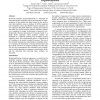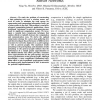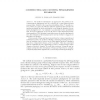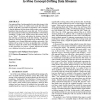1068 search results - page 119 / 214 » Extremely randomized trees |
ISMB
1993
13 years 11 months ago
1993
Molecular sequence megaclassification is a technique for automated protein sequence analysis and annotation. Implementation of the method has been limited by the need to store and...
TPDS
2008
13 years 10 months ago
2008
We study the problem of constructing a data gathering tree over a wireless sensor network in order to minimize the total energy for compressing and transporting information from a ...
JCB
1998
13 years 9 months ago
1998
Abstract. The method of invariants is an approach to the problem of reconstructing the phylogenetic tree of a collection of m taxa using nucleotide sequence data. Models for the re...
COR
2011
13 years 5 months ago
2011
This article comprises the first theoretical and computational study on mixed integer programming (MIP) models for the connected facility location problem (ConFL). ConFL combines...
KDD
2004
ACM
14 years 10 months ago
2004
ACM
One major problem of existing methods to mine data streams is that it makes ad hoc choices to combine most recent data with some amount of old data to search the new hypothesis. T...




